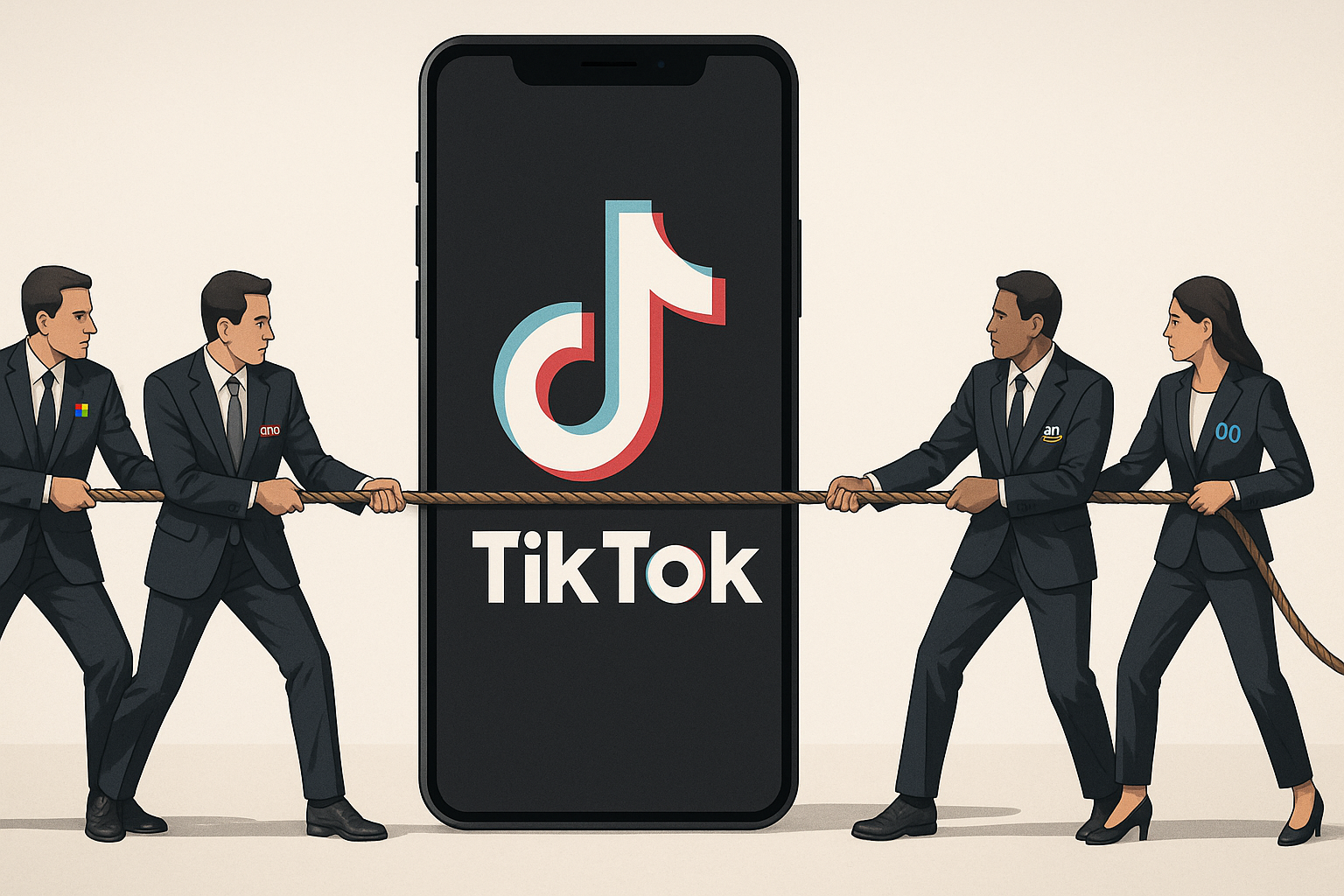The tech world's strangest courtship ritual continues to unfold with President Trump announcing that TikTok deal negotiations have "gone very well." I've been covering Silicon Valley acquisitions for years, but there's something uniquely fascinating about this corporate spectacle—a Chinese social media app simultaneously deemed too dangerous to operate independently yet valuable enough to spark a multi-billion-dollar bidding frenzy.
This isn't just another tech acquisition. It's geopolitics wrapped in algorithms, served with a side of teenage dance videos.
So who's lining up for this digital debutante ball? Let's take a look at our contestants.
Microsoft: The Middle-Aged Tech Dad Eyeing a Convertible
Microsoft emerged as the earliest serious suitor, which makes a certain kind of sense. Satya Nadella has spent years methodically rebuilding Microsoft's consumer relevance—and what could scream "relevance" louder than suddenly owning the platform where teens spend hours watching each other perform choreographed dances?
The company that built its empire on Excel spreadsheets now wants to be the home of viral challenges. It's... not the most natural fit.
But there's something almost poetic about this pursuit. Microsoft completely missed the first social media wave. (Remember their desperate Facebook investment back in 2007? No? Well, it happened.) This represents their chance at redemption—the digital equivalent of buying that convertible when you hit 50.
For Microsoft, TikTok would create an odd business mullet: LinkedIn's buttoned-up professionalism in the front, teenage dance party in the back. That's quite a corporate hairstyle to maintain.
Oracle: The Guy Who Showed Up at the Club in a Three-Piece Suit
Of all the potential buyers, Oracle's interest continues to baffle me the most.
A database company that primarily serves enterprise clients suddenly wants to be in charge of moderating content for teenagers? It's like watching your accountant audition for "The Bachelor." Nothing about this makes immediate strategic sense.
What Oracle does have, however, is political capital. Larry Ellison has cozied up to the Trump administration, hosting fundraisers and positioning Oracle as America's data champion. Their bid feels less about product synergy and more about opportunistically expanding their empire with governmental blessing.
Look, if Oracle wins this beauty contest, the culture clash will be something to behold. Just imagine database engineers trying to understand why kids are obsessed with something called a "WAP challenge." (I'm not explaining that one here—Google at your own risk.)
Amazon: The Empire That Prefers Conquest to Courtship
Amazon rarely enters bidding wars for established platforms. Their typical approach? Build it themselves or acquire tiny startups they can mold to their specifications.
But TikTok would give them instant social media relevance and another platform for their rapidly expanding advertising business. The problem? Regulatory hurdles that would make the Himalayas look like speed bumps.
In an era where Amazon already faces intense antitrust scrutiny, absorbing one of the fastest-growing social networks would be like... well, like pouring premium gasoline on an already raging Big Tech backlash bonfire.
Bezos might enjoy that challenge—he's never been one to shy away from a fight—but even he must recognize this acquisition would trigger regulatory responses that could make his Washington Post ownership look like a minor political headache by comparison.
Meta: The Copycat Who'd Prefer to Own the Original
Facebook's approach to TikTok has been refreshingly predictable: first ignore it, then copy it (hello, Reels!), and if that doesn't work, try to buy the damn thing. It's the same playbook they ran with Instagram and WhatsApp.
The difference now? Regulatory authorities would likely block such a deal before Zuckerberg finished signing his name.
Having attended several congressional hearings where Zuckerberg testified, I can confidently say that Facebook acquiring TikTok would be like Coca-Cola buying Pepsi—technically possible but practically unthinkable in today's antitrust environment. Though I suspect nothing would delight him more than eliminating his fastest-growing competitor while simultaneously resolving that China problem he's been highlighting in testimony.
Sometimes the best moves are the ones you can't actually make.
The Likely Winner? Something We Haven't Thought Of Yet
The constraints of this deal are honestly mind-boggling. Any solution must simultaneously satisfy U.S. security concerns, Chinese export restrictions, Trump's bizarre demand for Treasury compensation, and—oh yeah—actually make business sense.
That's why the most likely outcome probably isn't a straightforward acquisition at all. We might see a complex technological partnership, a consortium of investors with a tech company taking a minority operational role, or some entirely novel corporate structure invented specifically for this situation.
What fascinates me most about this saga (besides the sheer entertainment value) is how it reveals the strange intersection of geopolitics, technology, and finance in our current moment. A social network has become a diplomatic chess piece, with nations arguing over algorithms and user data like they once fought over territory and natural resources.
The digital age, folks. It's a weird one.
Whoever ultimately "wins" TikTok will face the same challenge that has confronted corporate acquirers since time immemorial: preserving what made the acquisition target valuable in the first place. And the history of tech acquisitions? It's basically a graveyard of innovative cultures that big companies paid billions to obtain—and then promptly smothered.
Will this time be different? I'm skeptical. But I'll be watching this strange corporate pageant until its final act unfolds.
The ending will likely be as novel as TikTok itself—and possibly just as bewildering to anyone over 30.
